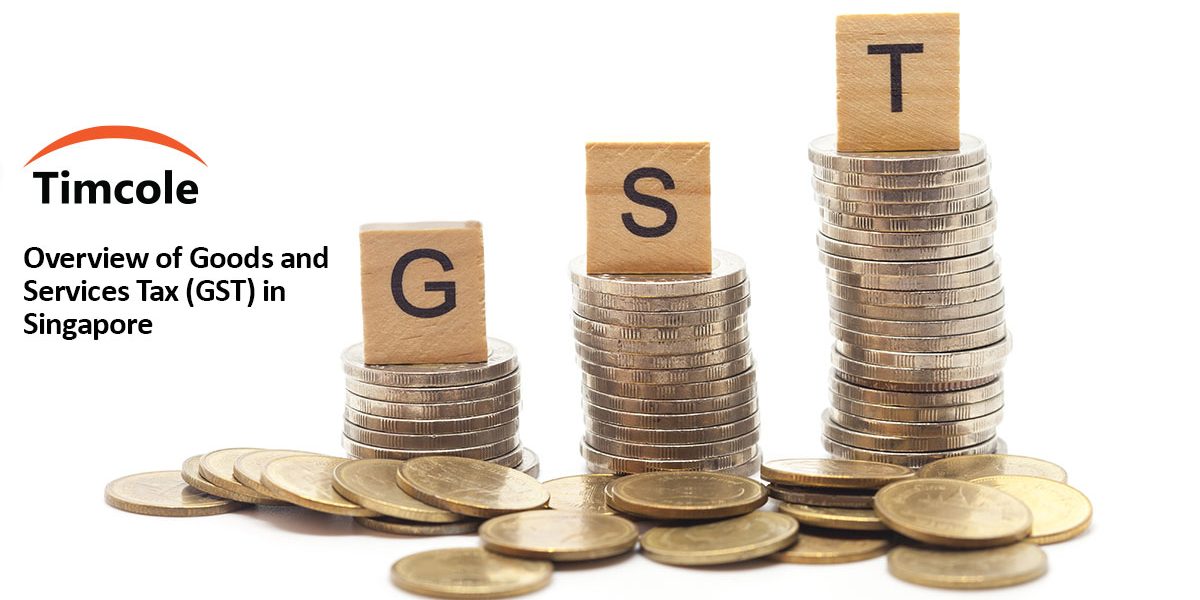Goods and Services Tax (GST) is a consumption tax levied on supplies of goods and services within Singapore as well as import of goods. Many other countries refer to GST as Value Added Tax (VAT). Presently, the GST rate in Singapore is 7%.
GST Registration
All companies in Singapore must register for GST if the taxable revenue they generate yearly is greater than S$1 million or if the annual taxable revenue and taxable income they have at the moment is expected to be greater than S$1 million. A business is expected to register for GST within a period of 30 days from the time it becomes liable.
Companies may also register voluntarily for GST. IRAS Comptroller is responsible for approving all voluntary registration. If IRAS Comptroller approves your company’s request to register voluntarily, your company must remain registered for a minimum of 2 years.
Charging and Collecting GST
After you register for GST, it’s a must for you to charge GST on every supply you make at the prevailing rate. This charged GST is called the output tax. You must pay the output tax to IRAS. Timcole offers GST filing services. Service fee guideline available here.
The input tax also exists. Input tax refers to GST you incur on business expenses and purchases. If your business satisfies certain conditions to claim input tax, then you can claim it on your business expenses and purchases.
The mechanism of input tax credit ensures that it’s only the value added that is taxed at every stage of the supply chain.
Check out other corporate tax filing services.
Type of Supplies
Generally, 4 types of supplies exist in Singapore:
1. Standard-Rated Supplies (7% GST)
This category of supply comprises the local sales of goods and services.
2. Zero-Rated Supplies (0% GST)
This category comprises international services such as export of goods and services.
3. Exempt Supplies (GST is not applicable)
- Financial services
- Rental and sales of unfurnished residential property
- Local supply and importation of investment precious metals
4. Out-of-Scope Supplies (GST is not applicable)
- Private transactions
- Sales that involves the delivery of goods from overseas to another location overseas
Kindly note that there is a plan to increase the GST from 7% to 9% sometime between 2021 and 2025. The factors that will determine this increase include the economy of Singapore, revenue from other taxes, and, government spending.
Time of Supply Rules Effective 1 Jan 2020
The time of supply rule is the earlier of the events below:
- When an invoice is issued in respect of the supply; and
- When payment is made in respect of the supply.
Conditions for Claiming Input Tax
Before you can claim input tax, you must satisfy the conditions below.
- You are GST-registered.
- You must be the person who has already imported the goods or the goods and services must be supplied to you already.
- You intend to use the goods or services only for the purpose of your business.
- At the time that you are claiming the input tax, the simplified tax invoices or valid tax invoices addressed to you must support local purchases.
- Import permit which identifies you as an approved importer of the goods must support the imports.
- The input tax must be directly attributable to taxable supplies or out-of-scope supplies which would stand as taxable supplies if carried out in Singapore.
- The input tax claims must be in line with Regulations 26 and 27 of the GST (General) Regulations.

Tax planning for companies is important. Learn more about tax planning here and how you can effectively plan your company tax.
Check out other related posts:
- Overview of Singapore Taxation
- Tax Saving for Setup Companies in Singapore
- Industry Specific Tax Incentives in Singapore
- Taxation for International Executives in Singapore
Tax Invoice
The major document to support an input tax claim is the tax invoice. It is important to always keep every tax invoice you issue to your customers and the ones you receive from your suppliers, for a minimum of 5 years.
You must issue a tax invoice when your customer becomes GST registered. Your customer must keep the invoice as a supporting document for claiming input tax on his or her standard-rated purchases. Generally, a tax invoice needs to be issued in less than 30 days from the date of supply.
You don’t need to issue a tax invoice for exempt supplies, zero-rated supplies, or to a non-GST registered customer.
All your tax invoices must give details on exempt supplies, zero-rated supplies, or other supplies that are applicable. The payable gross amount for each supply type must be separately stated.
Disallowed Input Tax Claims
According to Regulations 26 and 27 of the GST (General) Regulations, the following expenses can’t be claimed as input tax:
- Cost and expenses that are incurred on privately registered vehicles
- Benefits provided to relatives or family members or of your staff
- Club subscription fees paid to sports and recreation clubs
- Expenses incurred on company vehicles that COE has extended or renewed on or after 1 April 1998
- Expenses incurred on rental vehicles hired on or after 1 July 1999
- Medical and accident insurance premiums fees for your workers unless the payment of compensation or insurance is compulsory under the Work Injury Compensation Act or if collective agreement within the Industrial Relations Act makes such payment to be compulsory
- Medical bills paid for your staff except they are compulsory under the Work Injury Compensation Act or if collective agreement within the Industrial Relations Act makes such payments to be compulsory
- Transactions involving lotteries, sweepstakes, betting, or games of chance
Expenses That Employee Incur on Behalf of the Company
In general, you can’t claim input tax for purchases that are not addressed to the name of your company.
However, you will be allowed to claim input tasks if you are able to prove that your employee is the agent acting for your company in receiving goods or services supply.
Kindly note that the conditions below govern your input tax claim.
- Your GST registration
- The purpose of the goods or services
- The kind of supply that the input tax is attributable to
GST update – Customer Accounting for Prescribed Goods
Beginning at the first of January 2019, you are expected to apply customer accounting on a related supply of prescribed goods made to a customer who is GST-registered for his or her business purpose. Check out accounting and taxation packages here.
GST on imported services
Since the first of January 2020, businesses and consumers who buy imported services are required to pay GST.
You will have to account for GST on all the imported services you procure if you are either:
- a GST-registered voluntary welfare or charity organization that receives non-business receipts; or
- a GST-registered partially exempt business that has no entitlement to full input tax credit
Kindly note that you have the right to claim the GST that corresponds to your input tax.
Taxing Business-to-Consumer (“B2C”) digital services by way of an overseas vendor registration regime
You are expected to register for GST in Singapore if you belong outside Singapore and you meet the conditions below.
- You have a yearly global turnover that exceeds $1 million; and
- You supply digital services to customers in Singapore while exceeding $100,000
After you have registered for GST, you need to charge and give accounts for GST on every B2C digital service you render to customers in Singapore.
If you are an electronic marketplace operator
In some cases, when overseas suppliers render digital services through your marketplace, you might be regarded as the supplier of those services.
In such cases, you must add the value of those services to derive your GST registration liability. If you are already GST-registered or liable for GST registration, you must charge and give an account for the tax on all B2C supplies of digital services rendered through your marketplace. You are doing this on the behalf of the overseas suppliers since they are not present in Singapore to do so themselves.
Also, you must charge and give an account for all the digital services you render directly to customers in Singapore.
GST update – Supply of Digital Payment Tokens
Beginning on the first of January 2020, the provision/use of digital payment tokens for payment is not regarded as a supply for GST purposes.
For the purpose of GST, the supplies of digital payment tokens listed below are treated as exempt supplies.
- Loans provision of digital payment tokens
- The exchange of a digital payment token for another kind of digital payment token
A token must possess all the characteristics below before it is considered as a digital payment token
- It must be fungible;
- It must be expressed as a unit;
- No other currency should denominate it and no issuer should peg it to any currency;
- It is already or about to be a medium of exchange well accepted by the public or a section of it without any significant restriction on its usage;
- It can be stored, transferred, or traded electronically;
but excludes:
- Money
- Anything that would be an exempt supply of financial services if it were supplied
- Anything that entitles an individual to receive or direct goods or services supply from another individual and ceases to serve as a medium of exchange after the use of the entitlement.
Some examples of digital payment tokens are Ether, Bitcoins, Ripple, Litecoin, Monero, Dash, and Zcash.








